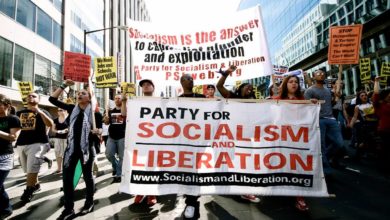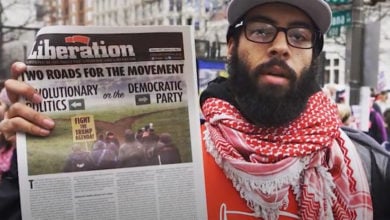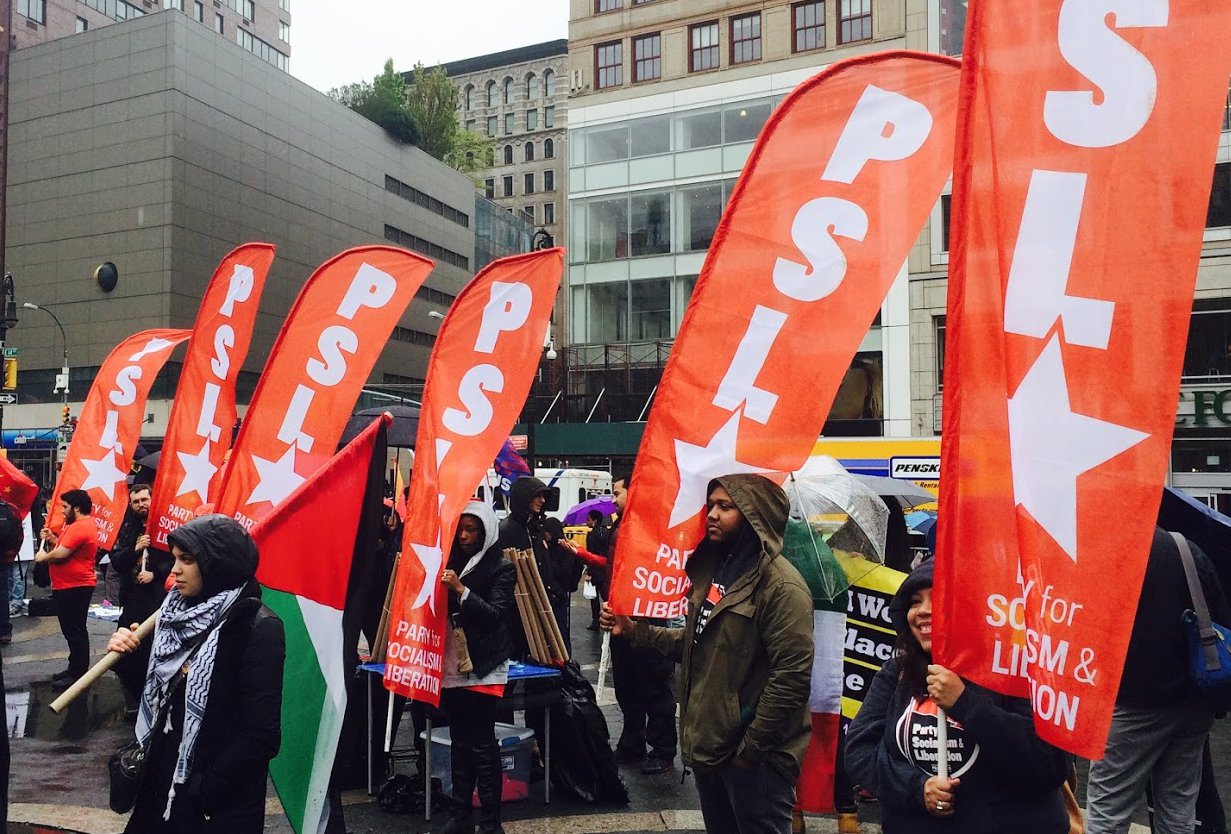Following is a talk given in a panel titled “Resisting
U.S. imperialism: Is it just bad policies or the system?” at the Nov. 13-14,
2010, National Conference on Socialism sponsored by the Party for Socialism and
Liberation.
Comrades and friends, thank you for attending. I will be
speaking about the Israeli occupation of Palestine and the role of U.S.
imperialism in sustaining it. As a dual citizen of both Palestine and the
United States, I see and feel the effect of imperialism there, and contribute
to it financially here. Since Palestine’s long history of occupation and
struggle cannot be fully discussed in the limited time I have to speak, I will
talk about Israel’s relationship with U.S. imperialism since its creation, and
some of the more recent and detrimental aspects of the occupation on the native
Palestinian population.
The U.S. government contributes about $7 million a day of
tax money in military aid to Israel. The Israeli Defense Forces, or Occupation
Forces, fully occupy both the West Bank and the Gaza Strip, but in different
ways. The situation in Gaza differs from that of the West Bank because it is
very brutal and extremely violent. There are 1.5 million Palestinians
completely entrapped in a space of 25 miles in length and 4 to 7 miles in
width. The Gaza Strip is currently the most densely populated area in the
world. A siege was placed on Gaza by Israel about three years ago, and because
of it, Gazans are denied the most basic human rights such as gas, electricity,
building materials and medicine. No export goods are allowed out, and the
economy has been destroyed. The effects of Israel’s devastating offensive on
the region in 2009 have worsened and continue to worsen the lives of people
there. The underground water infrastructure was almost destroyed, causing
sewage water to mix with drinking water, creating life-threatening
contamination. About 350,000 homes were destroyed, and countless others were damaged.
Unemployment in the region is at 42 percent. About 80 percent of the region’s
inhabitants are dependent on food aid.
The occupation of the West Bank differs in that it is more
hidden to the international community. Israel has implemented policies in the
territory that make daily processes more difficult while slowly swallowing more
land recognized as Palestinian. These policies include the construction and
expansion of settlements, demolitions and home evictions, travel restrictions
via checkpoints and roadblocks, and the creation of unstable access to water.
In the summer of 2010, the number of settlements reached 121 and 100 outposts,
housing about 450,000 illegal Israeli settlers. The increase in colonization of
Palestinian cities, especially East Jerusalem and Hebron, is due to the nature
of Zionism as well as a tool to try to claim historical presence in the land.
Traveling around the West Bank requires strategic planning. Routes are
obstructed with checkpoints, detours around settlements and Israeli-only roads,
and of course the Apartheid Wall. There are 59 permanent checkpoints around the
West Bank, about 37 permanent ones that are constantly staffed within the Green
Line, and about 418 other physical obstructions. These obstructions include earth
mounds, trenches, fences and concrete blocks. The Apartheid Wall has 63 gates,
and half are open to Palestinians by permit only. Besides that, the disparity
in water distribution leaves about 180,000 to 200,000 Palestinians without
access to running water. These among a multitude of other reasons have proven
Israel to be an apartheid state.
A recent controversial event was the amendment to Israel’s
ironically titled “Law of Return.” A citizenship law that previously forced
citizens to pledge allegiance to the “democratic state of Israel” has now
changed to the “Jewish and democratic state of Israel.” Anyone who can show
Jewish ancestry can return to Israel—“return” to a place that they may have
never been to—whereas native Palestinian refugees are denied that right. The
right of return must be defended as an inalienable right of every Palestinian
refugee and their descendants.
The new amendment is a deliberate attack on the Palestinians
within historical 1948 borders. It tries to disconnect them from their
historical ties to the land, and treats them as foreigners. It also attempts to
make Palestinians identify with Zionism, an ideology that has justified ethnic
cleansing, demolition of homes and apartheid.
Perhaps the greatest myth around the Palestinian-Israeli
conflict is that it is a centuries-old conflict, and that it revolves around
religion. This is false on both counts. Up until the late 1800s, Palestinians
and Arab Jews lived in relative peace in historic Palestine. It was around that
time that Austrian journalist Theodore Herzl began exploring the creation of a
Jewish state as the only solution to the anti-Semitism Jews faced in Europe.
Zionism resonated with the European middle class Jewry, who believed their
aspirations for higher economic and social status could not be realized unless
they had a state of their own. Working class Jews, on the other hand, largely
identified with their European homelands.
The Zionist project—essentially a colonial project—could
only succeed with the support of one of the imperialist powers. They found that
support in the British Empire in the aftermath of World War I. In exchange for
British sponsorship, the Zionist colonizers would help protect British
interests in the Middle East. The influx of Jewish immigrants to Palestine
grew.
Everyone who is interested in knowing more about this real
history should get a copy of the Party for Socialism and Liberation’s recent
book, “Palestine, Israel and the U.S. Empire.”
Imperialist pressure on United Nations member countries was
critical for the creation of Israel in the aftermath of World War II. The
Palestinian people had no say in it. Israel immediately launched a brutal
military campaign to expel the native Palestinian population. By 1956,
reflecting the new post-World War II balance of power, Israel had completely
shifted to the U.S. sphere.
Today,
Israel’s role in the Middle East is to serve as a watch dog and proxy army for
U.S. imperialism. Despite U.S.-Israeli aggression, Palestinians have shown they
will not surrender. Rather than break the backs of the Palestinian people, the
years of struggle have only strengthened our identity as a people and our
determination to fight back. The PSL stands by the right of Palestinians to
resist colonial and imperial aggression.
As
long as there is resistance to U.S. imperialism in the region, Israel’s actions
will go unchallenged by Washington. The Palestinians will continue to suffer
regardless of whether or not there are “peace” negotiations because their
struggle is viewed as hindering the imperialists’ intentions to restructure the
Middle East. The relationship between the United States and Israel is so
important that the Obama administration will not take real action to end
settlement expansion or promote equality because the goal is not peace but
continued domination. The only forces capable of changing this equation are the
people’s movements in Palestine, and here inside the United States, the center
of world imperialism.




